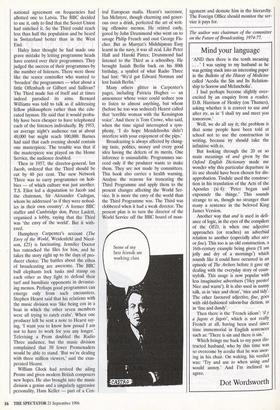Mind your language
'AND then there is the tenth meaning ' I was saying to my husband as he was getting stuck into an interesting paper in the Bulletin of the History of Medicine called 'Acedia the Sin and Its Relation- ship to Sorrow and Melancholia'.
I had perhaps become slightly over- excited by an enquiry from a reader, D.B. Harrison of Henley (on Thames), asking whether it is correct to use and after try, as in 'I shall try and meet you tomorrow.'
Well, we do all say it; the problem is that some people have been told at school not to use the construction in writing, because try should take the infinitive with to.
But looking through the 20 or so main meanings of and given by the Oxford English Dictionary made me wonder why this particular departure in its use should have been chosen for dis- approbation. Tindale used the construc- tion in his translation of the Acts of the Apostles (xi 4): 'Peter began and expounde the thinge.' This sounds strange to us, though no stranger than many a sentence in the beloved King James Version.
Another way that and is used in defi- ance of logic, in the eyes of the compilers of the OED, is when one adjective approaches (or reaches) an adverbial relation to another (especially after nice or fine). This too is an old construction, a 16th-century example being given (`I am jolly and dry of a mornings') which sounds like it could have occurred in an episode of The Archery before it gave up dealing with the everyday story of coun- tryfolk. This usage is now popular with less imaginative advertisers ('Hey presto! Nice and warm'). It is also used in nanny talk, as in 'nice and clean', 'nice and tidy'. The other favoured adjective, fine, goes with old-fashioned saloon-bar diction, as in 'fine and dandy'. Then there is the 'French idiom': 'if y a fagots et fagots', which is not really French at all, having been used since time immemorial in English sentences such as: 'There is sin and there is sin.'
Which brings me back to my poor dis- tracted husband, who by this time was so overcome by acedia that he was snor- ing in his chair. On waking, his verdict was: 'Try and use to when using and would annoy.' And I'm inclined to agree.
Dot Wordsworth


















































































 Previous page
Previous page